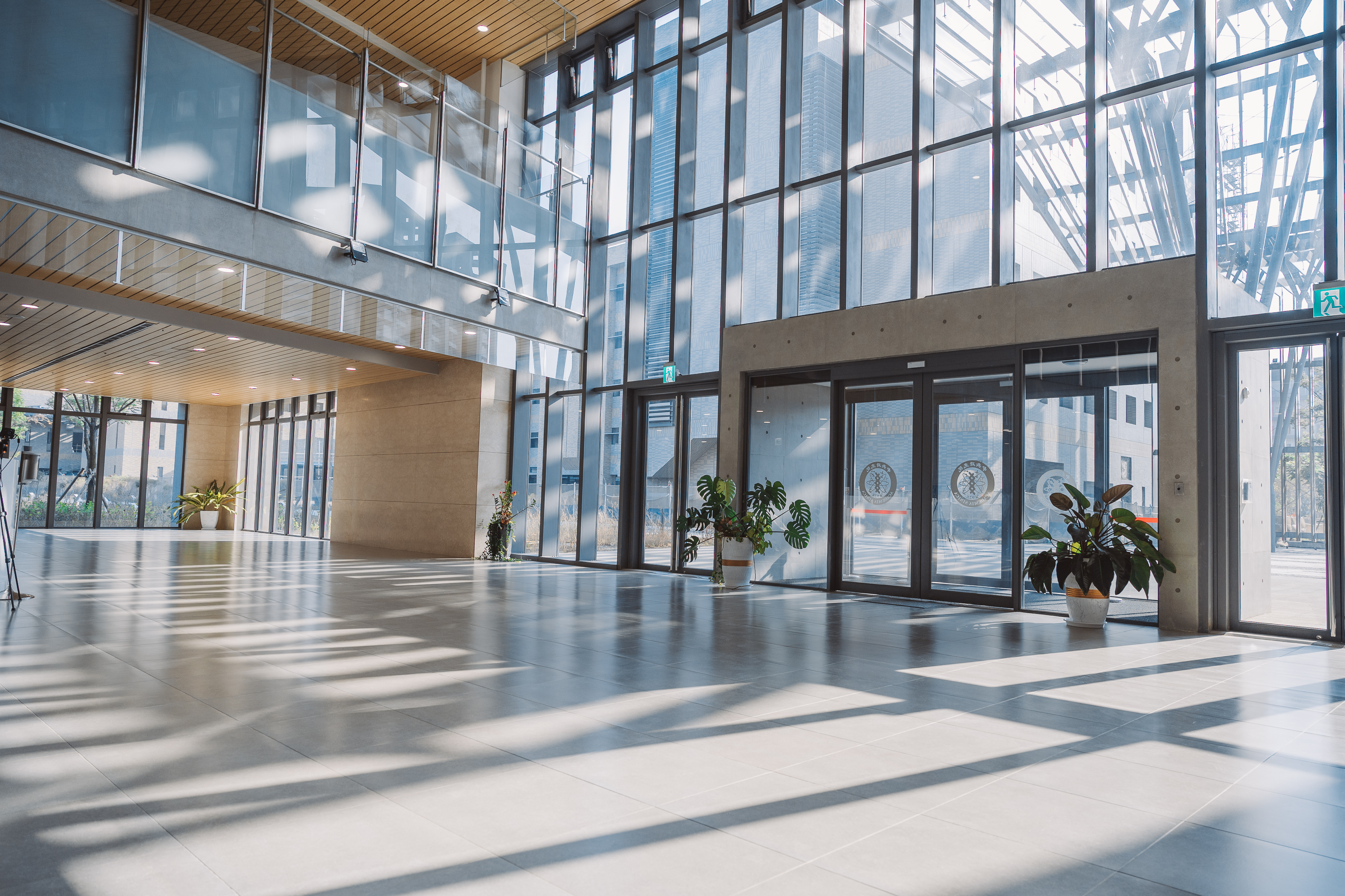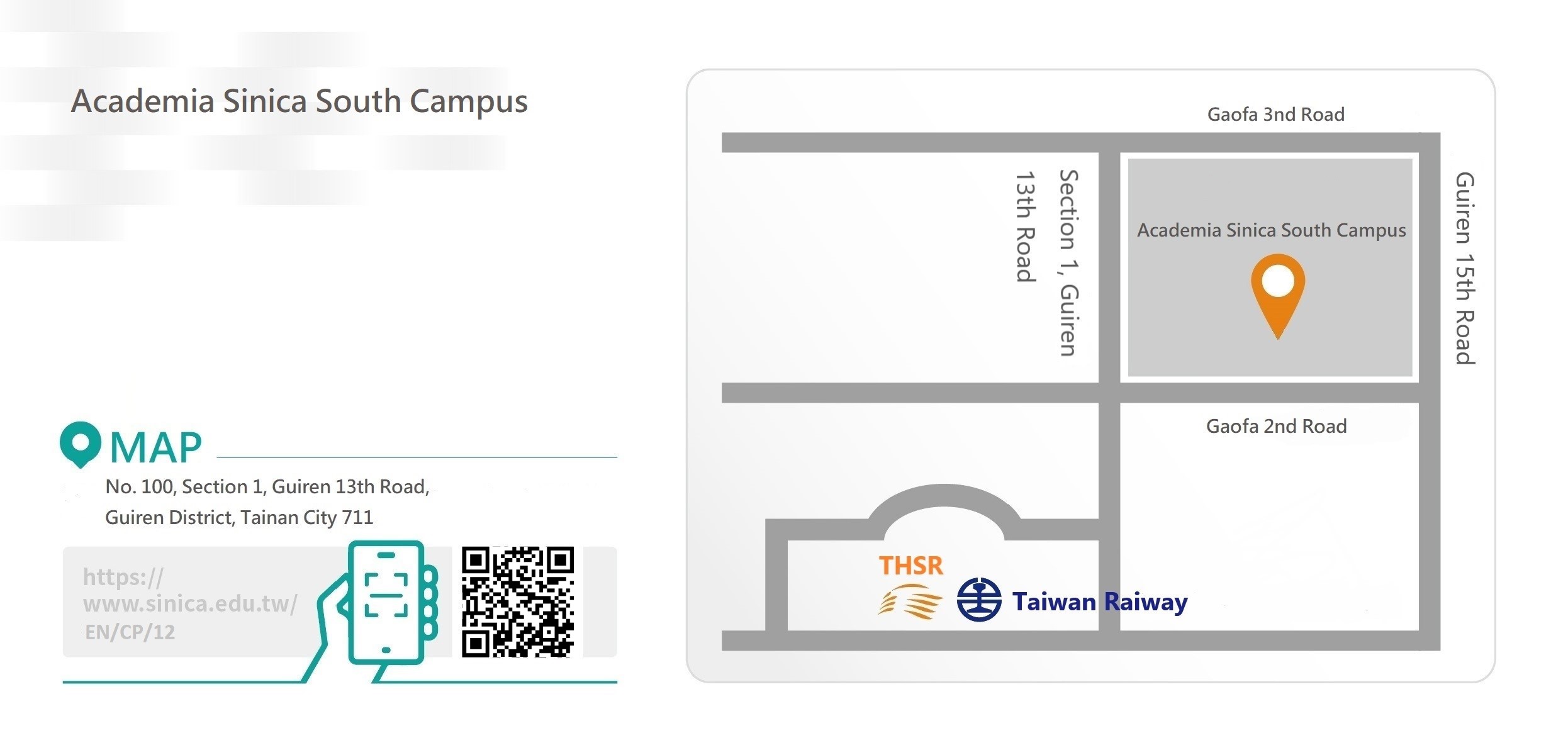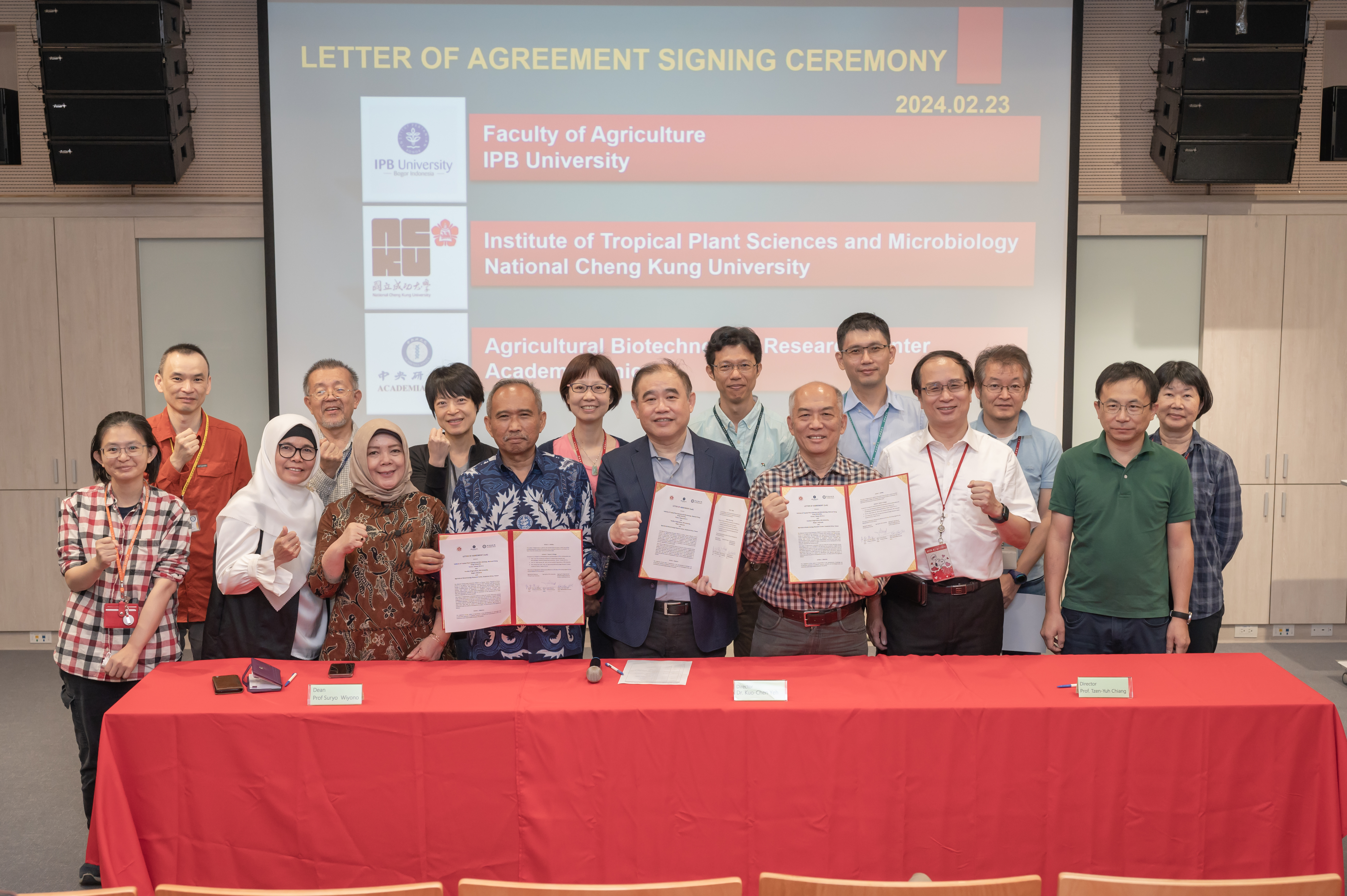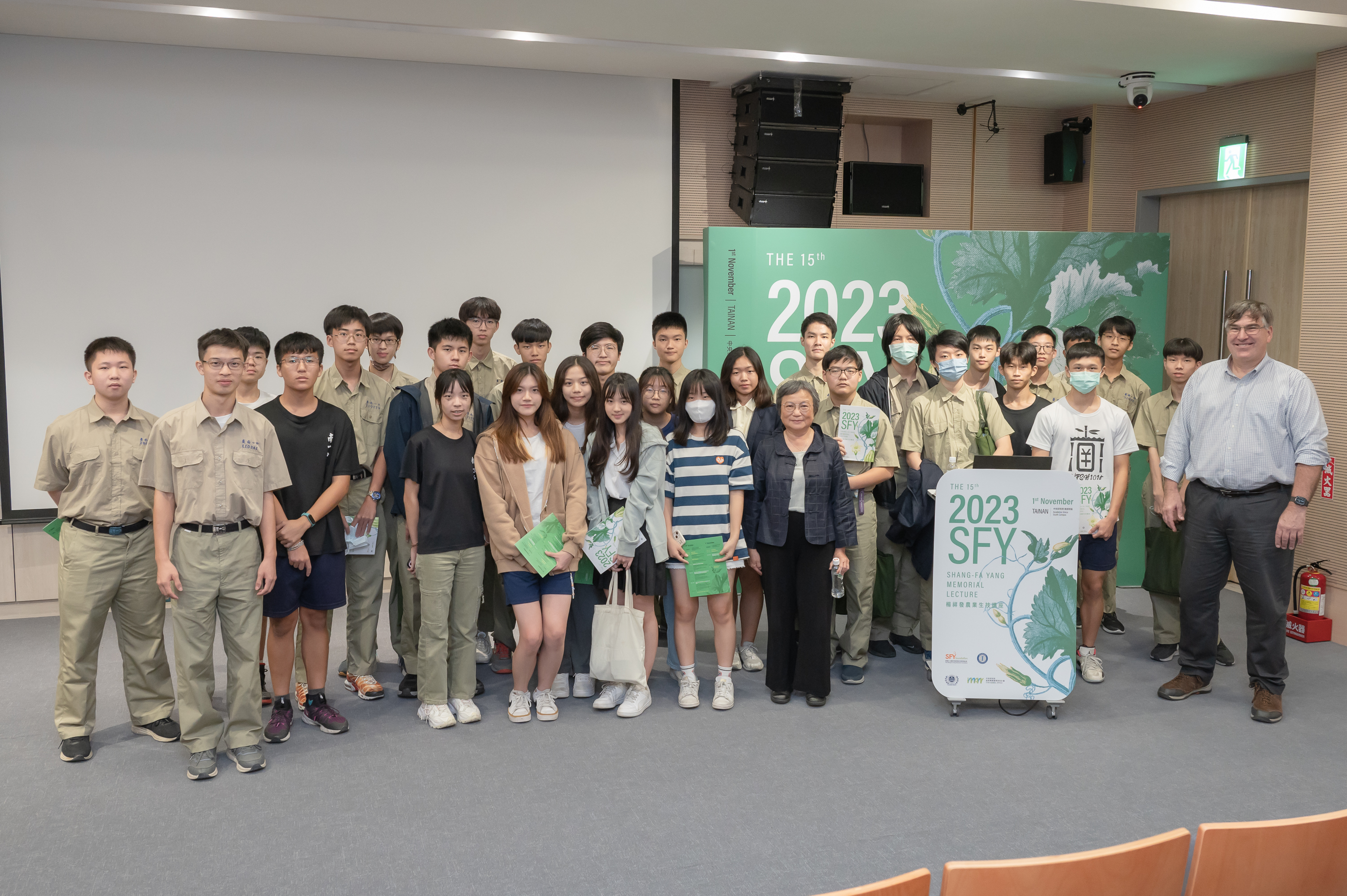-
South Campus
Academia Sinica South Campus map(Google Maps)

Development Goals
Academia Sinica is Taiwan’s pre-eminent research institution. Its mission has three major components: enhance research in the humanities and sciences; conduct, promote, and facilitate scholarly research; and cultivate outstanding academic talent. Academia Sinica encourages its faculty to focus primarily on solid, basic research, aiming for innovative development, enhancing national laboratories, and producing policy recommendations. In 2012, Academia Sinica initiated the establishment of the Academia Sinica South Campus (ASSC), in order to promote cutting-edge, basic research, improving talent, and expanding resources. Based in the earmarked development area near the Tainan high-speed railway station, ASSC aims to draw Taiwan’s prospective researchers together and stimulate regional academic development. After seven years of planning, the ground-breaking ceremony was held on May 11, 2018, and the first phase of the construction project was completed on September 21, 2020. Incorporating local talent and the unique regional environment, industry, and cultural resources, ASSC will build upon current resources from Academia Sinica and respond to new trends in socio-economic and academic development as well as global climate change. Emphasis will be placed on research in agricultural biotechnology, quantum technology, zero carbon sustainability, and in the humanities and social sciences. ASSC looks forward to developing characteristic research fields in the south and stimulate innovative thinking in agriculture, environment, culture and other research fields. By making the most of the regional advantages, ASSC will actively recruit talent from both domestic and international sources to enhance research and talent cultivation in Taiwan’s southern region. This will drive the continued development of industries, foster a cluster effect, implement technology in various industries, ultimately elevating the high-tech industries in southern Taiwan.
Features of the Academia Sinica South Campus
- Campus Environment and Landscape:
The overall design of the campus is centered on creating an international university town, promoting biodiversity, and adhering to sustainable development principles such as green and smart buildings. In the initial phase of construction, the spatial development and environmental features took inspiration from the essence of "agricultural biotechnology." The buildings are constructed around a central pond area, with lower interior and higher exterior structures. - Base Environment Facility Planning:
- The campus water system is planned with a low-impact development approach and the concept of sponge cities.
- Stormwater management: Multiple flood detention areas are established, which utilizes layered filtration, purification, and retention mechanisms to preserve water and reduce flooding.
- Water resource reuse: In Tainan, where evaporation exceeds rainfall during the summer, the central pond area incorporates floating islands, aquatic plants, and tree canopies to provide shade and reduce evaporation. The floating islands and aquatic plants help purify the water and provide habitat for aquatic organisms.
- Settings for Interaction between Knowledge and Environment:
Open spaces are centered and accompanied by flood detention ponds and a central green landscape, creating a majestic campus that embodies a grand atmosphere. The surrounding areas will also feature walkways to create a comfortable setting for communication within an excellent research environment. - Creating a Biodiversity Environment:
The emphasis on creating a quality living environment in ASSC is reflected in the incorporation of landscape water ponds with flood detention functions. These ponds not only serve as flood control measures while the southwest monsoon cools the campus and provide a favorable environment during the summer. Additionally, the ponds increase biodiversity and help water conservation.
Location
Academia Sinica South Campus MAP The Academia Sinica South Campus Map shows the location of the unit and the campus website link.
ABRCAgricultural Biotechnology Research Center, Academia Sinica
Biotechnology Center in Southern Taiwan, Academia Sinica
The Biotechnology Center in Southern Taiwan was the first research team to establish its presence at Academia Sinica South Campus, focusing on agricultural genomics, functional small molecule research, and translational agricultural applications.
We have established state-of-the-art facilities, including transgenic greenhouses, mass spectrometry facilities, bioinformatics platforms, and automated plant phenotyping systems. Utilizing advanced technologies such as functional genomics, metabolomics, signal transduction research, and bioinformatics analysis, we investigate the mechanisms by which Taiwan’s key crops—including rice, orchids, tomatoes, soybeans, bananas, and cauliflower—resist environmental adversities and defend against pests and diseases. Our research aims to advance precision breeding and crop improvement. In the field of functional small molecule research, we identify the chemical profiles of crops and explore their biosynthetic pathways to enhance both their economic value and resilience to environmental stress. Additionally, we integrate deep learning and image analysis to enhance crop phenotype accuracy.
We actively participate in large-scale projects, including the Key Breakthrough Project, the Agricultural Biomass Carbon Sequestration and Green Energy Technology Development Project, and the Sustainable Agronomy Project, contributing to the advancement of Taiwan's agricultural biotechnology industry.


Incubation Center in Southern Taiwan, Academia Sinica
The Incubation Center in Southern Taiwan provides workspaces, facilities, and related services to facilitate the translation of Academia Sinica’s research results in agricultural biotechnology and genomics into industry applications. Our goal is to support businesses in developing new technologies and products, conducting preliminary research and development, enhancing entrepreneurial opportunities, and nurturing new business ventures.Our primary focus is on advancing agricultural biotechnology research and technology platforms, collaborating with academic and research institutions in southern Taiwan to drive technology innovation and cultivate industry talent.
We welcome applications from:Domestic and international enterprises
Individuals with R&D expertise and innovative technologies
Academic and research institutions both within and outside Academia Sinica
For details on the application process, please refer to our website.
 RCCI
RCCIResearch Center for Critical Issues, Academia Sinica
Objective
In January 2024, Academia Sinica established the Research Center for Critical Issues (RCCI) to assist the nation and society in addressing major challenges, by providing world-class research and development solutions to critical problems.
:彭信坤秘書長、施明哲院士、周美吟副院長、廖俊智院長、關鍵中心李超煌.jpg)
Research Programs on Critical Issues
RCCI emphasizes team-based thematic centers and research projects that conduct research and development aligned with national policies or have significant impacts on society. The goal is to apply research outcomes to help address critical issues facing the nation and society. Currently, RCCI has selected two areas—"Net-Zero Technology" and "Quantum Technology"—for inclusion in the center’s thematic centers and research projects.

In the field of Net-Zero Technology, the "Thematic Center for Marine Energy," the "Next-Generation Solar Cell Research Project," and the "Methane Pyrolysis Research Project" have been incorporated. The Thematic Center for Marine Energy focuses on projects such as Kuroshio Current power generation and seaweed carbon sequestration. Two surveys of the Kuroshio Current have been completed, the anchor point for the power generator has been selected, and the construction of a 100-kW ocean-current power generator has begun. In terms of seaweed carbon sequestration, some suitable species have been selected, and new cultivation techniques are under development. Larger-scale carbon sequestration experiments will be conducted in suitable areas off the eastern coast of Taiwan. In addition, the Department of Natural Sciences and Sustainable Development, National Science and Technology Council (NSTC) has launched the "Taiwan Marine Observatory System" core facility project, which is jointly executed by RCCI and the Taiwan Ocean Research Institute. The overall goal is to enhance domestic marine research capabilities and expand substantive cooperation with the Ocean Affairs Council and the National Academy of Marine Research.
The "Next-Generation Solar Cell Research Project" primarily focuses on developing large-area, high-efficiency perovskite/silicon tandem solar cells, aiming to increase efficiency to nearly 30% while also investing in automated manufacturing process development. The "Methane Pyrolysis Research Project" focuses on the methane pyrolysis technology, which breaks down natural gas into hydrogen and solid carbon black. Hydrogen can be mixed in appropriate proportions into natural gas generators to reduce carbon emissions during power generation. The resulting solid carbon black is a valuable industrial material with applications including tires, plastics, lithium battery electrodes, and construction materials.
In the field of Quantum Technology, the "Thematic Center for Quantum Computer" and the "Quantum Photonics Research Project" are housed in RCCI, with the establishment of clean rooms and testing laboratories. The Thematic Center for Quantum Computer is developing prototypes of general-purpose quantum computers, standardizing the chip manufacturing process, conducting preliminary quantum computations, and developing related subsystems, including high-speed digital control circuits and Cryo-CMOS components. The Quantum Photonics Research Project focuses on developing high-efficiency, high-brightness single-photon emitters with indistinguishable photons, as well as high-sensitivity, fast-response superconducting nanowire single-photon detectors. These developments are closely tied to the future quantum technology industry in Taiwan.
Another important mission of RCCI is to establish core facilities related to the aforementioned research projects, such as fabrication and testing facilities for superconducting quantum computers, fabrication and analysis facilities for quantum photonic devices, and facilities for characterizing solar cell thin films and quantifying device efficiency. These facilities will be open to researchers nationwide, with dedicated technical staff responsible for operation and technical support.
In addition to the two main research areas, RCCI is also planning research projects in the humanities, aiming to introduce advanced information technologies to accelerate the progress of humanities research. RCCI strives to offer practical solutions across various fields, contributing to the advancement of scientific research and societal progress in Taiwan.
 Research Hub for Humanities and Social Sciences
Research Hub for Humanities and Social SciencesResearch Hub for Humanities and Social Sciences
The advancement of humanities and social sciences research is a key mission of the Academia Sinica South Campus. To support this goal, we have established the Humanities and Social Sciences Research Hub, which houses a Digital Library and Archive Room to share Academia Sinica’s extensive digital resources with readers in southern Taiwan.
Currently, research teams have moved in, focusing on the social transformation of southern Taiwan and the trade networks of Taiwanese businesses. The arrival of humanities and social sciences scholars will further strengthen collaborations with local academic communities, historians, and cultural researchers.
We look forward to welcoming more research teams in the future to work alongside scholars from central and southern Taiwan in exploring research topics with a distinctive southern perspective and significant historical, cultural, and social impact.


- Campus Environment and Landscape:
Open
2/25/2026 3:09:58 PM
-
-
- Institute of Mathematics
- Institute of Physics
- Institute of Chemistry
- Institute of Earth Sciences
- Institute of Information Science
- Institute of Statistical Science
- Institute of Atomic and Molecular Sciences
- Institute of Astronomy and Astrophysics
- Research Center for Applied Sciences
- Research Center for Environmental Changes
- Research Center for Information Technology Innovation
-
-
- Institute of History and Philology
- Institute of Ethnology
- Institute of Modern History
- Institute of Economics
- Institute of European and American Studies
- Institute of Chinese Literature and Philosophy
- Institute of Taiwan History
- Institute of Sociology
- Institute of Linguistics
- Institute of Political Science
- Institutum Iurisprudentiae
- Research Center for Humanities and Social Sciences
-
-
-
South Campus

- Address:128 Section 2, Academia Road, Nankang, Taipei 115201, Taiwan
- Phone:+886-2-27822120~9 (10 lines)
- Contact:aspublic@gate.sinica.edu.tw









 Home
Home